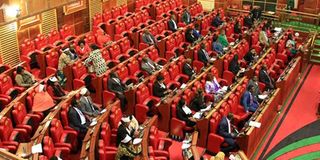Lawmakers don’t have powers to raise their pay and benefits

The National Assembly. Our legislators must be alive to the fact that they are brewing resentment from the people of Kenya who are struggling to make ends meet. PHOTO | JEFF ANGOTE | NATION MEDIA GROUP
What you need to know:
- Kenya is grappling with paying its debts and the economy is in a slump.
- Moreover, one of the reasons some people are proposing a referendum is to reduce the wage burden.
- SRC must protect the sovereignty of the people, require that parliament observes democratic values.
The Justice and Legal Affairs Committee recently tabled a Bill in the National Assembly, which proposes higher salaries; a rent-free house in addition to the Sh20 million mortgage facility they already have; a government vehicle; an expanded medical cover for all the 416 MPs.
Additionally, a monitoring allowance will be paid to the 47 elected Senators from a Sh2 billion fund annually.
Already, the Kenyan lawmakers are some of the most well-remunerated in the world.
They beat their counterparts in the First World, including the USA, Britain, France and Japan.
Besides, Kenya is grappling with paying its debts and the economy is in a slump.
WAGE BURDEN
Moreover, one of the reasons some people are proposing a referendum is to reduce the wage burden.
Which begs the question: Are our legislators in touch with reality? Do they have contempt for fellow Kenyans? Do MPs have the power to increase their own salaries and benefits? What is the role of the Salaries and Remuneration Commission (SRC)?
The drafters of the Constitution of Kenya 2010 were alive to the fact that leaders have the tendency to award themselves large amounts of salaries, allowances and other benefits without following any laid-down guidelines.
It was for this reason that the SRC was formed to review the remuneration and benefits of all state officers; and advise the national and county governments on the same.
SUSTAINABILITY
In doing so, they must take into consideration the fiscal sustainability of salaries; recognise productivity and performance; and, ensure transparency and fairness.
In 2013, just before the coalition government of President Mwai Kibaki and Raila Odinga wound up, Parliament passed a law that provides retirement benefits of leaders and state officers, including the President, the Prime Minister, director- general of the National Intelligence Service, the Inspector-General of the National Police Service, the Secretary to the Cabinet, the Attorney-General, Chief Justice and his deputy, Speakers of the National Assembly and Senate and their deputies and the Director of Public Prosecutions.
Because the SRC was not consulted, the Kenya National Commission on Human Rights challenged its constitutionality.
In September 2015, Justice Isaac Lenaola declared the Presidential Benefits (Amendment) Act of 2013 unconstitutional and invalid on account that the National Assembly did not consult the SRC in setting the retirement package for former presidents and other state officers.
He said it was unconstitutional to bring into law, legislation concerning the benefits of state officers without involving the SRC.
STATE OFFICERS
What the court rightly affirmed was that matters salary, remuneration, allowances, retirement, benefits and adjustment to inflation incidental to “all state officers” were the sole province of the SRC pursuant to express provisions of Article 230 (4) (a) and (b) of the constitution.
As such, the recent proposals by the Justice and Legal Affairs Committee as a matter of law must be subjected to SRC review and approval.
I suspect that the SRC, guided by its mandate and expertise will find that the proposals are untenable, unnecessary, unsustainable, not transparent and unfair.
The way our legislators are acting is reminiscent to what the French Monarchy was doing before they drove the people of France to revolt.
Some of the parallels include the fact that the government was deeply in debt and as such attempted to restore its financial status through unpopular taxation schemes; Leading up to the Revolution, there were years of bad harvests worsened by deregulation of the grain industry; and, popular resentment of the privileges enjoyed by the aristocracy and the Catholic clergy of the established church.
These factors are the realities in Kenya currently.
DEEP IN DEBT
Kenya is heavily in deep debt and the economy is doing badly; this has prompted the government has increase taxes such as the 8% fuel tax; maize farmers have been disenfranchised; the price of food and inflation has skyrocketed; corruption is diverting money meant for essential services and infrastructure; and now, MPs, who are one of the most well paid in the world, want to further burden the taxpayers to afford them lavish privileges and benefits.
Our legislators must be alive to the fact that they are brewing resentment from the people of Kenya who are struggling to make ends meet.
They should be more concerned with representing their constituents rather than burdening them.
The Salaries and Remuneration Commission must be true to its mandate and assert its authority and independence as required by the Constitution.
SRC must protect the sovereignty of the people, require that parliament observes democratic values and principles and promote constitutionalism.
Demas Kiprono is a human rights lawyer Email: [email protected] Twitter: @kipdemas. Mutuma Mathiu’s column to resume next week





